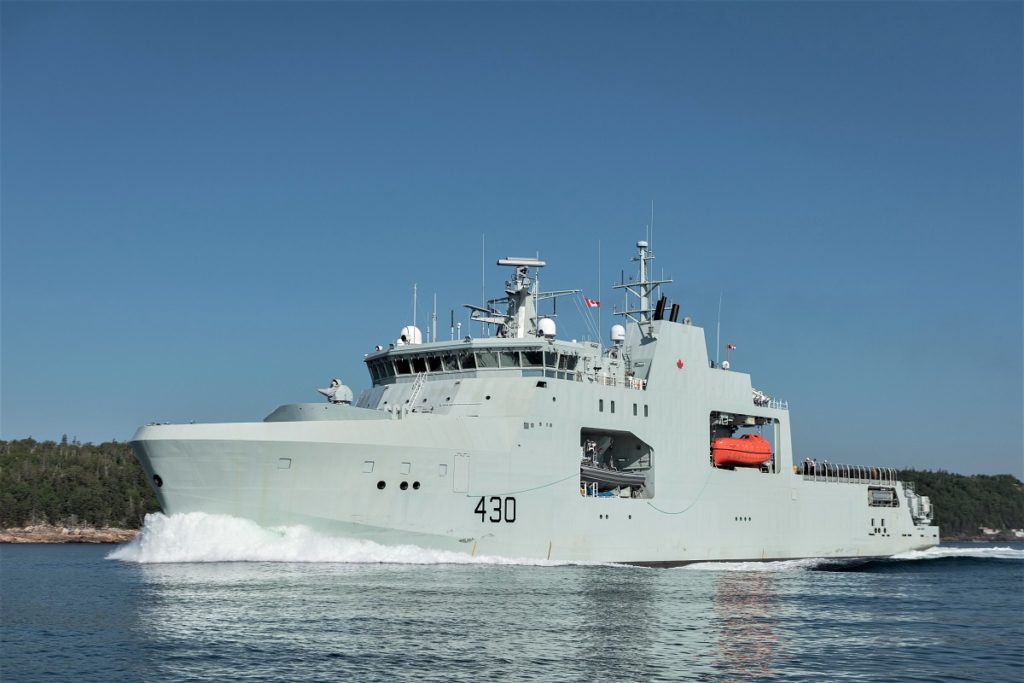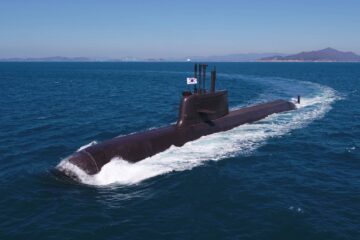Royal Canadian Navy press release
The ship will begin the four-month deployment with participation in Operation Nanook in the Arctic region, and will carry on by sailing through the Northwest Passage, something that hasn’t been done by a Canadian warship in more than 60 years. From there, Harry DeWolf will complete the circumnavigation of North America while supporting Operation Caribbe in the Eastern Pacific and Caribbean Sea.
“This is a mission that fully demonstrates the capabilities of our ship and the new capabilities of the RCN. This goes far beyond just focusing on sovereignty in the North – we’ll be doing all that this class of ship can do.”
Rear Admiral Brian Santarpia, Commander of Maritime Forces Atlantic and Joint Task Force Atlantic (JTFA)
Testing and trials over the past year for Harry DeWolf have demonstrated that the ship can successfully operate year-round, in both the frigid conditions of the arctic and in warmer southern waters, which is a unique feature.

“HMCS Harry DeWolf now has thousands of miles on its odometer, and we’re about to embark on a patrol that hasn’t been done in more than 64 years. It’s no small feat.”
Commander Corey Gleason, ship’s Commanding Officer
Op Nanook is a signature annual exercise focused on preparing Canada to respond to any crisis situation or security issue that may arise in the North, and Harry DeWolf will be conducting surveillance patrols and other activities alongside HMCS Goose Bay as well as US Coast Guard partners. Once the mission transitions to Op Caribbe, the ship will continue working with the US Coast Guard to disrupt the flow of controlled narcotics and other illicit cargo.
Along with the more operational components of the mission, Cdr Gleason said he and his crew are particularly excited to continue highlighting the ship’s affiliation with the Indigenous communities of the North. Each of the RCN’s six Arctic vessels will be affiliated with different regions of the Inuit Nunangat, with HMCS Harry DeWolf tied to the Qikiqtani region, which includes Nunavut’s capital city of Iqaluit.
Interacting and building ties with the communities of the region will be a key component of Harry DeWolf’s arctic operations, beginning right away on this maiden deployment, building on the official visits and dialogues with local leaders that have already taken place.

Describing a future scenario that could see locals on board RCN ships, providing input as the RCN traverses their territorial waters. The region isn’t well surveyed, which can lead to tense situations for navigator, Cdr Gleason said:
“I really look forward to expanding those relationships, and I personally have some very big ambitions when it comes to expanding the range of military programs in the region.”
“We like to look at charts with numbers and depths; when we go north, we don’t have that. Our Inuit partners know those bodies of water and they can help us operate much more safely.”
Commander Corey Gleason, ship’s Commanding Officer
The ship’s company of HMCS Harry DeWolf is 100 percent vaccinated against COVID-19, and as always, extensive testing was done prior to the departure from Halifax with help from Canadian Forces Health Services staff. Tests will also be administered ahead of any port and community visits to ensure all interactions are safe.
-End-
About AOPS / Harry DeWolf-class

The AOPS project will provide the RCN with six new ice-capable ships, as well as two variants of the AOPS for the Canadian Coast Guard. Construction of the seventh and eighth ships is expected to begin in 2022 and 2023, respectively.
At 103 metres and 6,615 tonnes, HMCS Harry DeWolf is the largest Royal Canadian Navy ship built in Canada in 50 years. The vessels are built by Irving Shipbuilding’s Halifax Shipyard. The second ship of the class was launched in November 2019. The class is fitted with a Mk 38 Mod 2 25mm main gun by BAE Systems. Sensors include Terma SCANTER 6002 radar system and a Lockheed Martin Canada Combat Management System (CMS 330).
The Harry DeWolf-class patrol ships will be able to perform a wide variety of tasks, such as:
- Provide increased presence and conduct surveillance operations throughout Canada’s waters, including in the Arctic;
- Support Canadian Armed Forces (CAF) sovereignty operations;
- Participate in a wide variety of international operations, such as anti-smuggling, anti-piracy or international security and stability;
- Contribute to humanitarian assistance, emergency response and disaster relief domestically or internationally;
- Conduct Search and Rescue (SAR) and facilitate communications among other ships;
- Support CAF core missions including capacity building in support of other nations; and
- Support other government departments in their ability to enforce their respective mandates.
The Harry DeWolf-class patrol ships will operate in the Arctic between June and October, providing a greater, and longer, CAF presence in the north. They will be capable of operating in first-year ice of 120-centimetre thickness. This will allow the Royal Canadian Navy to have unescorted access to areas of the Arctic that were previously inaccessible.






